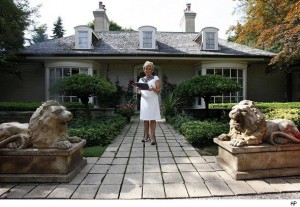Real Estate Careers Background
 The real estate business helps fulfill one of our most basic needs: shelter. For many people, this shelter is a house. But real estate is more than just shelter and houses. It includes apartments, condominiums, cooperatives, farms, retail stores, office buildings, shopping centers, warehouses, industrial plants, medical centers, and many other types of property. Hundreds of thousands of licensed professionals sell, lease, manage, appraise, or otherwise work full time in the real estate industry. The industry also provides employment for many part-time and support personnel.
The real estate business helps fulfill one of our most basic needs: shelter. For many people, this shelter is a house. But real estate is more than just shelter and houses. It includes apartments, condominiums, cooperatives, farms, retail stores, office buildings, shopping centers, warehouses, industrial plants, medical centers, and many other types of property. Hundreds of thousands of licensed professionals sell, lease, manage, appraise, or otherwise work full time in the real estate industry. The industry also provides employment for many part-time and support personnel.
The right to possess property has existed in some form since the beginning of civilization. Early nomadic societies distributed property rights among tribes and families and were probably the first to maintain communal ownership of specific plots. For those nomadic societies where land was bountiful, tribes had no need to secure individual plots of land or establish permanent residences.
The urban orientation of ancient Greece caused the dissolution of communal properties. Individual and familial ownership of land was the norm. This notion of the absolute right of ownership continued until the end of the Roman Empire.
With the decline of the Roman Empire and the subsequent barbarian invasions, families and landowners had little with which to guard their belongings and protect their land. The ensuing desire for security led to the feudal system of the Middle Ages. In feudalism, a lord held vast lands in his dominion (hence the word landlord). Those who lived on his land and farmed it were called vassals. Vowing homage and fealty (fidelity) to their lords, vassals were guaranteed protection of their lives and their chattel, or possessions. The lord, in turn, owed homage to his king, acting as the king’s vassal. So strong was the bond between vassal and lord that vassals were not considered free. However, they were not slaves either: They were more like tenants who paid their rent with the products they farmed. They were also expected to perform military services in times of war. While the lord presided over the land, vassals farmed individual plots of land and passed the rights to their offspring.
With the dissolution of the feudal system in the 13th century, vassals were able to claim true ownership of the land that they farmed. In France, however, homage and fealty were not abandoned completely until the revolution in the late 1700s, when the aristocracy was abolished. At that time, the common person obtained unconditional freedom and with it the right to own land. Such rights had not been in existence in France since the Roman Empire nearly 1,300 years earlier.
Ironically, while common people were asserting their rights to the ownership of land in Europe, European nations were establishing vast empires overseas, claiming foreign lands as their own and subjecting the native inhabitants to their system of rule. The Spanish and the Portuguese took over Central and South America. The French dominated parts of North America, Southeast Asia, and northern and western Africa. The British annexed India, parts of North America, eastern and central Africa, Hong Kong, Australia, and numerous other areas. It was said during Britain’s peak that the sun never set on the British Empire because Britain claimed land in every part of the world.
Through various treaties and purchases, the United States acquired all of its land (with the exception of Alaska and Hawaii) by the 1850s. As the American frontier opened up in the 19th century, pioneers claimed open public lands. By clearing the unclaimed land, farming it, and building a home on it, the settlers felt that they had earned the right to the land’s title for free or for a nominal price. This established what now is known as squatter’s rights. The Pre-emption Act of 1841 officially declared squatter’s rights as legitimate, gaining the support of the U.S. government because it encouraged citizens to settle west of the established states. For another 50 years, more than 200 million acres of land changed from government to private ownership, until Congress abolished the act in 1891. During this time, some individuals developed fortunes in land holdings without actually farming the land as was required by law.
So began the American system of real estate. Once private ownership of land became widespread, the need to monitor and facilitate the exchange of property grew. A number of different careers developed from this need.
The real estate industry in the United States has grown dramatically over the last 20 years. With property values increasing, transactions becoming more complicated, and property changing hands more frequently, more people are turning to real estate professionals for help in the task of buying or selling real estate.
